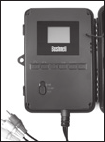
24
Reviewing Images on an External Video Monitor
A TV monitor can also be used to play back pictures (or
videos) from the device. Connect a TV monitor or a viewing
device (such as a digital picture frame) that has a standard
composite video input (RCA jack) to the Trophy Cam ‘s
“A/V Out” mini jack using the supplied cable. Then:
• Put the power switch in SETUP mode (switch to OFF
first).
• Press the OK key. The most recently captured image
will be shown on the video monitor. For video clips,
press the SHOT (RIGHT) key to start playing, press
again to stop.
• Press the UP key for the previous photo or video and the DOWN key for
the next one. When viewing images, the total number of all images in the
SD card and the index of the displaying image are shown in the center of
LCD and at the bottom of the video monitor respectively.
• Press the OK key to return to live preview state (SETUP mode) when
playback is finished.
Reviewing Images by Connecting the Camera to a Computer
You can always unmount the entire camera from the tree and connect its USB
port to a computer-it will be recognized as a “removable disk”, without the
need to install any drivers or software. When using a PC (or Mac*) to view
photos (or video clips*), first connect the device to the computer with the
supplied USB cable. Then use commercial software with an image browser
feature, or an image browser included with the PC’s operating system to view
images saved on the SD card in the folder \DCIM\100EK113. Each new
image or video will be numbered incrementally in order of the time it was
captured. For example, you will see file names such as “PICT0001.JPG” or
“PICT0001.avi”, etc. Through the file format suffix you can distinguish whether
the file is a still photo (with suffix .jpg) or a video (with suffix .avi or .mov,
depending on your model).
*video files may require additional software for viewing on a Mac.
The Trophy Cam supports 3 kinds of file system formats, FAT12, FAT16, and
FAT32. The default value is FAT16 to save photos and videos. Here are some
related notes:
Cable from
“A/V Out”
